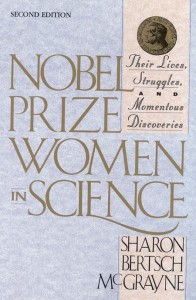 Which well-known scientists can you name off the top of your head? That’s an easy one, you might say: Albert Einstein, Isaac Newton, Charles Darwin, perhaps even Brian Cox if you want someone quite modern. But what about female scientists? Marie Curie and, er…anyone else?
Which well-known scientists can you name off the top of your head? That’s an easy one, you might say: Albert Einstein, Isaac Newton, Charles Darwin, perhaps even Brian Cox if you want someone quite modern. But what about female scientists? Marie Curie and, er…anyone else?
This lack of knowledge about women in science is a widespread phenomenon and one I freely admit to. Did you know, for example, that until 2001 over three hundred men had been awarded a Nobel Prize in science in comparison to just ten women? In her book Nobel Prize Women in Science: Their Lives, Struggles and Momentous Discoveries, Sharon Bertsch McGrayne attempts to fill this gap by describing the lives of these winners and a further five women whose contributions were unrecognised – or, indeed, ignored – by the (predominantly male) scientific communities of their time.
McGrayne goes into tremendous detail about every aspect of these women’s lives and, at times, the outright discrimination sometimes seems difficult to comprehend. Lise Meitner, a nuclear physicist who discovered the theoretical facts behind fission, was initially barred from laboratories and lectures due to her gender. Instead, she was forced to work in a basement and often hid behind furniture to gain access to lecture halls. Similarly, mathematician Emmy Noether was not allowed to lecture under her own name for thirteen years (instead billing herself as her male colleague’s ‘assistant’) and worked without pay for decades. However, this book does not simply dismiss men of the time as ignorant. Many of the women were part of highly successful scientific partnerships, and men such as Pierre Curie sacrificed their careers and research interests in order to help their wives succeed.
There is also a sustained link within the book charting the developments within science and the way that these women interacted (or at times competed) with one another. Reading the constant prejudice faced by women within the initial chapters can feel like an exercise in frustration. Yet this idea of progression ultimately ends these biographies on a note of hope: we begin by reading about the world of Marie Curie where women could not study; the final woman discussed, Christiane Nüsslein-Volhard, does not even consider such difficulty. It is clear to see the improvements within the scientific world over the book’s 140-year timespan.
While the book may be slightly heavy (some scientific explanations are simply too dense for a non-specialist), McGrayne makes sure to balance this out with broader terms and stories of personal interest. At points the narrative reads closer to fiction rather than biography (‘His auburn crew cut, limpid eyes, grave smile, and simple manners instantly reassured her’) but, while this may at times feel out of sorts, it is clear that McGrayne is aiming to humanise these women, defining them by their personalities rather than showing only their academic accomplishments. She achieves this by thorough research, face-to-face interviews and simple one-sentence anecdotes, perhaps the most memorable one coming from Maria Goeppert Mayer, who simply forgot to get dressed for work one day and arrived wearing a dressing gown.
As stated, more women have received Nobel prizes since the second edition of this book was published in 2001. This fact, along with the huge amounts of information imparted, means that this book serves both as a compendium of information and a beginning point for further study. Just as there are constant new inventions within technology, these women can inspire the discoveries of a new generation of female scientists.

One reply on “‘Nobel Prize Women in Science: Their Lives, Struggles and Momentous Discoveries’ by Sharon Bertsch McGrayne”
[…] Weekly Book Review Glasgow’s Women’s Library Book Review Kirkus Reviews Book Review The Beautiful Stars Book […]